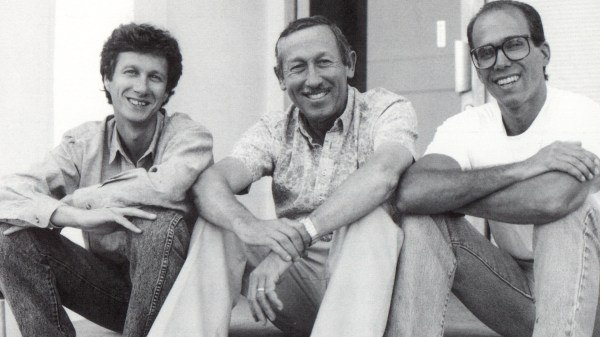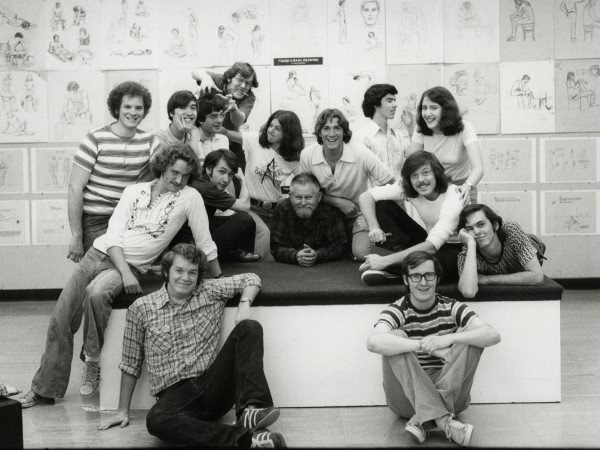We talk to the filmmakers behind the brilliant documentary about Disney's second animation renaissance.
Check out the Waking Sleeping Beauty trailer and clips at AWNtv!
The phenomenal yet bittersweet comeback of Disney Animation from '84 to '94, encompassing The Little Mermaid, Beauty and the Beast, Aladdin and The Lion King, is a testament to artistic passion and astonishing ego. And Waking Sleeping Beauty, opening tomorrow in limited release, captures the rise and fall of this tempestuous period with insight and candor, blending archival footage with brand new audio interviews. In separate conversations with Peter Schneider (who was president of feature animation and later studio chief) and Don Hahn (producer of the Oscar-nominated Beauty and the Beast), we get more of the inside story from the producer and director of Waking Sleeping Beauty. Meanwhile, Schneider and Hahn will be making Q&A appearances at several screenings this weekend: the producer will be at the Landmark Sunshine Cinema New York City and Hahn will be at the AMC Century City on Friday and the AMC Burbank 16 on Saturday.
Bill Desowitz: What was this period like?
Peter Schneider: It was a great time, a very emotional time and a lot of good work got done by a lot of really good people.
BD: Well, people at Disney have told me it's an honest portrayal.
PS: Well, I think they were genuinely surprised at how honest it was when they saw it.
BD: Were there any surprises for you?
PS: Let's see: Not a lot struck me as out of the ordinary. What struck me was that everybody [from] this period of time roughly had the same story. And they may have had a different take on it, but they all felt the same way. But, ultimately, everybody -- Michael, Jeffrey, [Roy] me, Don, the artists -- all had a piece of the story that all fit together correctly. There was nothing out of synch with it, if you know what I mean. And that's what was so interesting to me.
BD: Randy Cartwright's home movies are astonishing. But any surprises uncovered among the archive footage?
PS: I think the Howard Ashman tapes. None of us had ever seen [them], and, for me, that's the emotional core, the emotional center of the movie. That to me was the most moving and surprising. He was a real storyteller. And there's this great story that our Roy used to tell about being sick in bed and Walt comes by and tells him the story of Pinocchio. And as Roy liked to say, when he finally saw it in a movie theater it wasn't as good as listening to Uncle Walt tell it. And what is so striking about that is that Walt did all the characters.
BD: Howard was very Walt-like, wasn't he?
PS: Yes, he tells the story. When you listen to the music, he's telling the story through music and the lyrics. And he sings the songs the way they're supposed to be through all those demos. He came up with the idea of Ursula being the divine-like character, sort of larger than life. He was the one in the movie who says make the crab Sebastian more modern and hip. And, of course, you realize it's such a smart nuance -- it's not Maurice.
BD: What about the unsung Frank Wells?
PS: Yeah, I think people don't know much about Frank. My favorite story about this movie is that we're screening in the Frank Wells building for Disney employees. And there was one employee who had no idea who Frank Wells was. And I said, "Well, where do you work?" And she said, "In the Frank Wells building." And she had never put together that Frank Wells was a modern person and had some huge influence on the company to have a building named after him because it was all about the present. Frank died 16 years ago. That was a long time ago and people forget.
BD: And yet when Roy waits outside his office to get him to sign off on CAPS, you realize how important he was.
PS: A little thing: it changed the course of history at Disney… and funding Pixar. All these things, moving so fast, I don't think we ever stopped to think about them. And it's fun to be looking back at them and giving people a sense of what happened. And the idea of using old footage cut against modern interviews is the artistic key to the movie and why I'm so thrilled that Don directed the movie because it's a real nuanced thing he did.
BD: And the dark side of success seems so inevitable. What was the alternative: failure?
PS: I heard later on that what Frank said to somebody was, "What they really need is to have a movie that doesn't work." That's an interesting comment in terms of not getting carried away with yourself because, like everything in life, most of it is fleeting.
BD: Was this cathartic?
Don Hahn: Yeah, not only for me but for everybody. I recorded so many interviews with all of the directors from the period and many of the key animators and executives and it was very cathartic. And everyone has strong memories and stories to tell. Even Jeffrey Katzenberg was so generous with his time: he gave me a two-hour interview on tape and watched the movie with us when it was all cut, and it was very cathartic for him and Michael and Roy, for that matter, before he passed away.
BD: What did Roy think of movie?
DH: He saw it on DVD because he was quite ill toward the end and liked it a lot. He sent us a very, very nice note. And actually his caregiver later said he had watched it four times just before he passed away, so I think for him it was a nice capper about a big part of his life.
BD: I've heard about the great reaction at Disney and Pixar, but what's the reaction been outside the studios?
DH: We've actually shown this to a few business schools at USC, UCLA, the University of Chicago and the conversations have been as interesting as anywhere just about the lessons that this movie might reveal, and it's an interesting time because of that.
BD: Do you think the downfall was inevitable?
DH: Yes, it was but I think there a few things that could've sustained it. When I look at Pixar and Ed and John have been really supportive of Waking Sleeping Beauty -- we've shown it up there three times, I think -- they made some smart choices and took some risks that I'm not sure we did. We got a little stuck in the Alan Menken musical mode and they stepped out and did Ratatouille and Up. And by also bringing in new people it's going to change that culture and for the best. We brought in new people in 1984, '85 and '86, and 10 years later there's not that influx again so that energy begins to wane. And people get distracted and there was a natural growth.
BD: Any surprises?
DH: In the moment of making it, I was surprised by the candor, particularly by the executives that wanted to be involved. I knew Roy would but Michael and Jeffrey as well even though Michael was hesitant at first, he would say, "Good luck with the movie -- I just don't want to be a part of it." But then he would send me a videotape the next day and not to quote him, and then he would send me a memo, so he was testing what we were doing but surprisingly open to the idea that we were doing the movie. Same with Jeffrey; same with Roy. And I guess I wasn't surprised that Howard was the hero of this story, if there is a hero. And how deep those emotions still are about Howard and we and how he represented our Walt Disney, the way John Lasseter represents that today. Or Jeffrey Katzenberg even. But back then it was Howard and to lose him at such a young age was tough.
BD: And Frank Wells?
DH: I hope we humanized Frank just a little bit: he was a tough taskmaster but he's faceless, people don't really know him. He had this pragmatic approach to business and he was a mountain climber. I was also surprised that Frank and Roy went to school together at Pomona College. You realize that so much of this change was so radical, bringing in these guys from Warner Bros. and Paramount. It was almost predestined. Stanley Gold, who was Roy's representative, went jogging every morning with Frank Wells. These people knew each other for decades before they ever came to Disney. And the power of relationships really shows through.
BD:What was Jeffrey's reaction?
DH: Well, he's a different person now. He still is driven but he is much more of a benevolent person, much more gracious -- and he has made more animated movies than Walt Disney. It was never nerve racking working with Jeffrey, so when we went back to talk to him, I was nervous, because I didn't know what would happen, but he was surprisingly gracious and giving and candid. When he said he didn't hear about the new animation building being announced, he said it was hurtful and it portrayed much more under the surface than I thought was ever there. And the fact that he opened up to that and that we put it into the movie was to his credit. And, in a funny way, I think he and Michael and Roy were communicating to each other through these interviews, because they would ask, "What does Roy think of me?" or whatever. And I think the toughest part was showing the movie to Jeffrey. He told us it wasn't the way he would've done it; it wasn't the series of events that he would've focused on; but he found it particularly [moving] in light of his relationship with Howard. He's a very forward-looking guy: I don't think he normally looks back and is reflective. But for him to stop for 85 minutes and reflect was a very emotional experience.
BD: And Michael?
DH: We showed it to everybody. I wanted to sit alone with people and watch it and hear their comments, whatever they were. With Michael, it was pretty much the way it was to work with him: the comments were not so much about him but about the film creatively and he actually helped with restructuring it a little bit and made the film a little better. He was always circumspect about it, but, in the end, he owned it as much as any of us. He realizes that it's his story and a fair account of what happened back then.
Bill Desowitz is senior editor of AWN & VFXWorld.












